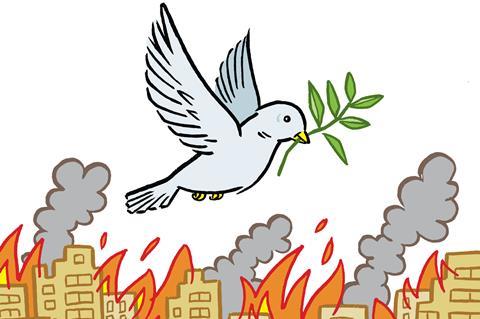A peace agreement between God and humanity has been reached, writes Rend Collective’s Chris Llewellyn

It’s not going to be easy to sing ‘Silent night’ this year. Because the sad truth is, all around the world, all is not calm, and all is not bright.
In so many places, the idea of sleeping “in heavenly peace” seems a very distant, naive notion right now, disconnected from the violent realities bombarding us in the news. Bethlehem is, after all, just a few miles from a battlefield.
There isn’t sufficient power in our nostalgic, neutered version of the Christmas story to speak meaningfully to these times. No amount of hot chocolate, cosy carols or viewings of Elf are going to make us forget the violent world we’re living in.
I think we need to tell the story differently this year.
Christmas is the story of a ceasefire. A refugee child was born to us and his name was “Prince of Peace” (Isaiah 9:6). He came to break the perpetual cycle of vengeance, declaring an end to “eye for eye” retaliation (Matthew 5:38-39) which, as Gandhi allegedly observed, leaves the whole world blind.
Jesus introduced us to the radical ethic of enemy love. He offered forgiveness freely and infinitely – 70 times seven (Matthew 18:22). Then came the ultimate act of conflict resolution on the cross. Rejecting the expectations of a military messiah, he absorbed the violence of the empire – and the collective onslaught of humanity’s sin – and didn’t fight back. He allowed the injustice of his execution to go unavenged.
Someone always has to be the last victim if there is to be peace, and God, in Christ, decided it should be himself. We were “enemies” of God (Colossians 1:21) but we are now reconciled. A peace agreement has been reached.
This Christmas, I don’t want to just hear that story, but respond to it. How can I be a peacemaker? How can I be a minister of reconciliation?
Maybe it’s about choosing to support aid organisations that work in conflict zones around the world. Maybe it’s about dealing with the violence in our own hearts and staying tender towards those who disagree with us on social media. All I know for sure is that our “glad tidings of great joy” (Luke 2:10) don’t mean much if we’re not pursuing real-life peace on earth.
Yet we will still need those glad tidings. It might not be easy to sing ‘Silent night’ this year…but I will still sing it, nonetheless. Songs and art don’t change the world by themselves, but they can serve to open up our imagination, reminding us of new, hopeful possibilities. They take us beyond the insanity of believing that we can bomb our way to peace; that we can “live by the sword” (Matthew 26:52).
When I find myself becoming hopeless, I remind myself of the remarkable story of Christmas carols ringing out over no-man’s land in 1914, blending British and German voices, and announcing the beginning of a Christmas truce. Telling – or singing – the story of the Prince of Peace stopped a war in its tracks, temporarily at least. Who is to say that couldn’t happen again?





































1 Reader's comment